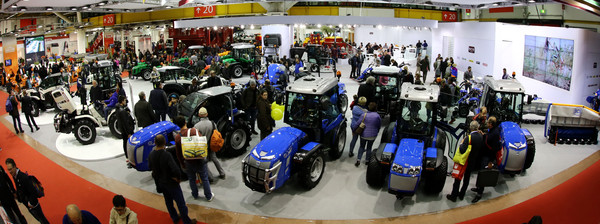
European policies, "new deal" for agriculture
During the political conference entitled "Agricultural machinery: towards a new European agenda", the European association of agricultural machinery manufacturers CEMA asked for the revision of the relevant communitarian legislation, with regulations and technical requirements tailored not on automotive sector but on agricultural mechanics
Innovation in farming represents a priority for the development of global economies, but shall be supported by policies of action properly calibrated on characteristics and requirements of specific territories and rural communities. From industrial plans to research, passing through technical regulations, the agro-industrial sector requires an extensive approach, involving all the supply chain’s players. These are the issues addressed by EIMA International, with the conference entitled “Agricultural machinery: towards a new European agenda”, promoted by FederUnacoma in collaboration with CEMA, the European association of agricultural machinery manufacturers and Agrievolution, the international body which brings together the main manufacturing countries. The meeting, organized with the aim to promote the debate between entrepreneurs, institutions and political world, hosted Paolo De Castro, deputee of the Commission on Agriculture of the European Parliament; Elisabetta Gardini, deputee of the Commission on Environment of the European Parliament; Aldo Longo, General Director of the European Commission on Agriculture and Rural Development; Barbara Bonvissuto from “Grow” Directorate-General of the European Commission; Richard Markwell, president of CEMA; Massimo Goldoni, president of FederUnacoma; Pekka Pesonen, secretary general of COPA-COGECA; Klaus Pentzlin, president of CEETTAR; and Alice Cerutti, vicepresident of Ceja. During the speeches given at the conference – moderated by the journalist from Il Sole 24 Ore Roberto Iotti and opened with greetings from the President of the ICE Agency Michele Scannavini – speakers took stock of the relaunch of strategies for a sector that in 2015 recorded a consistent sales drop (-6%) and that will not reverse this negative trend, up to the end of 2017. European manufacturers – explained the president of CEMA, Richard Markwell – can boast a leadership position in the world, with regard to production volumes and innovation. Therefore, with a renewal rate equal to 1.7% on a yearly basis, European vehicle fleets suffer from a “technological delay”. The gap is mainly due to a reduction in agricultural income and farms undersizing, combined with difficulties met by machinery manufacturers, who are dealing with communitarian regulations and requirements that cause a significant increase in production costs. These rules were in fact originally laid down for the automotive sector and then extended to agricultural mechanics, as if these two branches had the same needs and trends. “Underestimating the peculiarities of agricultural mechanics in a context characterized by a severe competition – explained Markwell – means to weaken the position of manufacturers and farmers themselves”. The speakers stressed the crucial need to invest in technological innovation to produce more with less, by improving resource efficiency: to do this, are required a new communitarian legislation on agricultural machinery, an improved data sharing and a system facilitating investments in mechanization to support farmers. And still, directives and regulations shall be standardise internationally.
“Europe is often unable to address these problems effectively – pointed out European Parliament’s member Elisabetta Gardini – and several times struggles to communicate the obtained results. We are all involved in protecting this sector and in supporting research and innovation”. “In Europe we have high standards with regard to emissions and safety; – explained deputee Paolo De Castro – however, this is not the same in the rest of the world, and since we are in a global competition, we have to establish our own regulations, for not being subjected to the others’ rules. China for instance, will have a huge need for agricultural machinery in the future, but we need to understand if are able to be present on the market, and face the challenge of divergent standards between countries”. In other speeches the focus was on the demand for “good regulations” for agricultural machinery and their harmonization on a global level – and, in primis with regard to emissions. The need for an overall approach of legislation was highlighted, and for a dialogue involving all stakeholders. “We must build a “new deal” for the sector of agricultural mechanics, with extensive policies and strategies, conceived to strengthen competitiveness of European manufacturers and promote the use of innovative technologies by farmers – claimed the President of FederUnacoma Massimo Goldoni – and this is the challenge that we want to launch together with the European CEMA manufacturers”. “Mechanics shall be a constant presence in the political agenda – concluded Goldoni – and shall be recognized as a key factor in farming development”.








